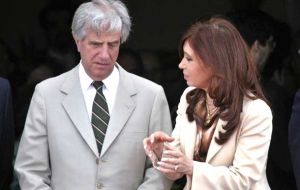MercoPress. South Atlantic News Agency
Argentina/Uruguay clash over export duties in Mercosur
 Pte. Vazquez and his Argentine counterpart have difficulties understanding each other
Pte. Vazquez and his Argentine counterpart have difficulties understanding each other Neighboring Uruguay and Argentina have again clashed over trade in the framework of Mercosur. Argentina is complaining about a 2% consular levy Uruguay applies to all imports while Uruguayan authorities argue that the controversial farm export taxes distort market conditions.
"President Cristina Kirchner's farm export taxes not only make commodities imports from Argentina dearer but are an unfair competition for Uruguayan products wishing to enter the Argentine market since they have artificially cheaper commodity inputs", according to Uruguayan diplomatic sources Argentina's claim is "incoherent" added the sources, "things would be far easier for Mercosur if we didn't have these distorting export restrictions". The latest example of Argentine "distortions" was the increase in the reference price of natural gas exported to neighboring countries to which it applies export duties of 100%, which "for the Uruguayan consumer and manufacturers has meant an unexpected increase ranging from 10 to 30%". This is just another example of the continuous rift between both countries: while Uruguay has insistently requested greater "flexibility" from its Mercosur partners to negotiate trade agreements with third parties, Argentina has tried to incorporate, --unsuccessfully--, the export taxes into the Mercosur Customs Code. Last week during the Mercosur Trade Commission meeting, Argentina officially requested Uruguay to eliminate the 2% consular levy on imports. This followed a previous May similar "immediate" request arguing Uruguay did not apply the levy on Mexican goods, a third party of Mercosur, and that any form of trade restriction was contrary to the Asuncion treaty. Uruguay at the time replied that the bank levy had been retroactively eliminated as of January 2008 and the consular levy would disappear January 2010, before dropping to 1% in July 2009. The gradual elimination is geared to absorb the impact of the revenue loss estimated in 70 million US dollars. However Uruguay also pointed out that "levies are marginal and do not have significant consequences for Mercosur partners". Uruguayan diplomatic sources also indicated that following the collapse of the Doha Round global trade talks, "Mercosur should retake block negotiations with United States and the European Union" to keep advancing the integration process. "We are going to request further flexibilization for negotiations with third parties, so countries can advance at different speeds to their goals", said Elbio Rosselli, head of Economic and Mercosur Affairs from the Uruguayan Foreign Office. Rosselli said Argentina has chosen a "development model very different from the rest of Mercosur members, emphasizing a protectionist neo-industrialist option with barriers to shelter domestic production which is difficult to make compatible with the block's external negotiations". This was patent clear in the recently failed Doha round ministerial summit in Geneva where Brazil and Argentina voted divided in opposing options.




Top Comments
Disclaimer & comment rulesCommenting for this story is now closed.
If you have a Facebook account, become a fan and comment on our Facebook Page!